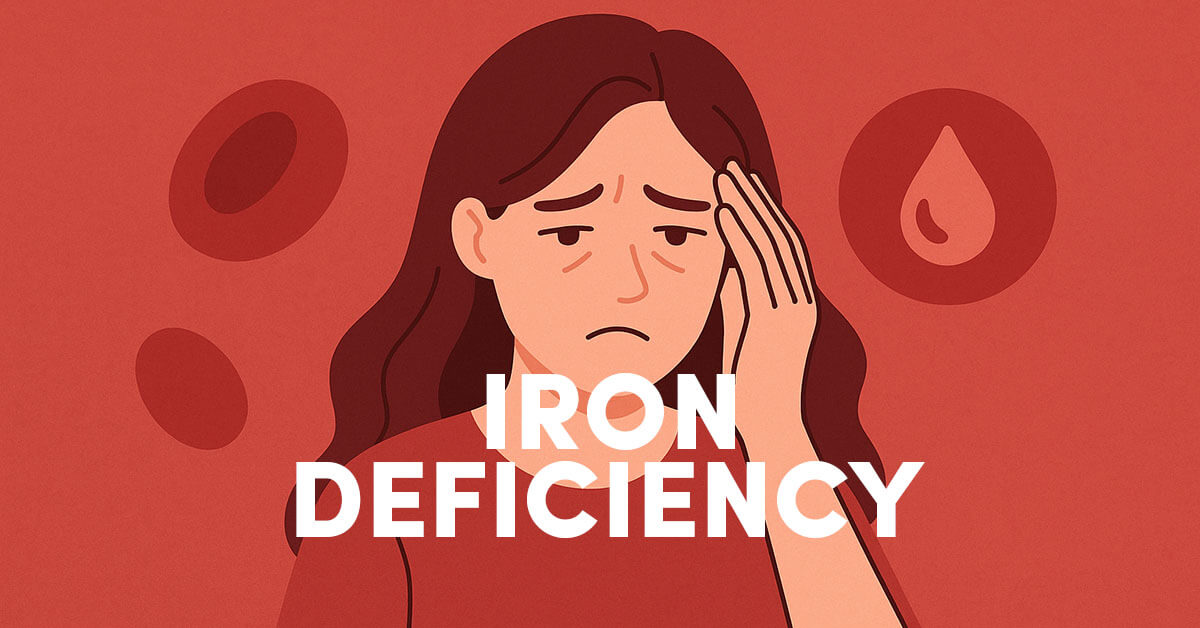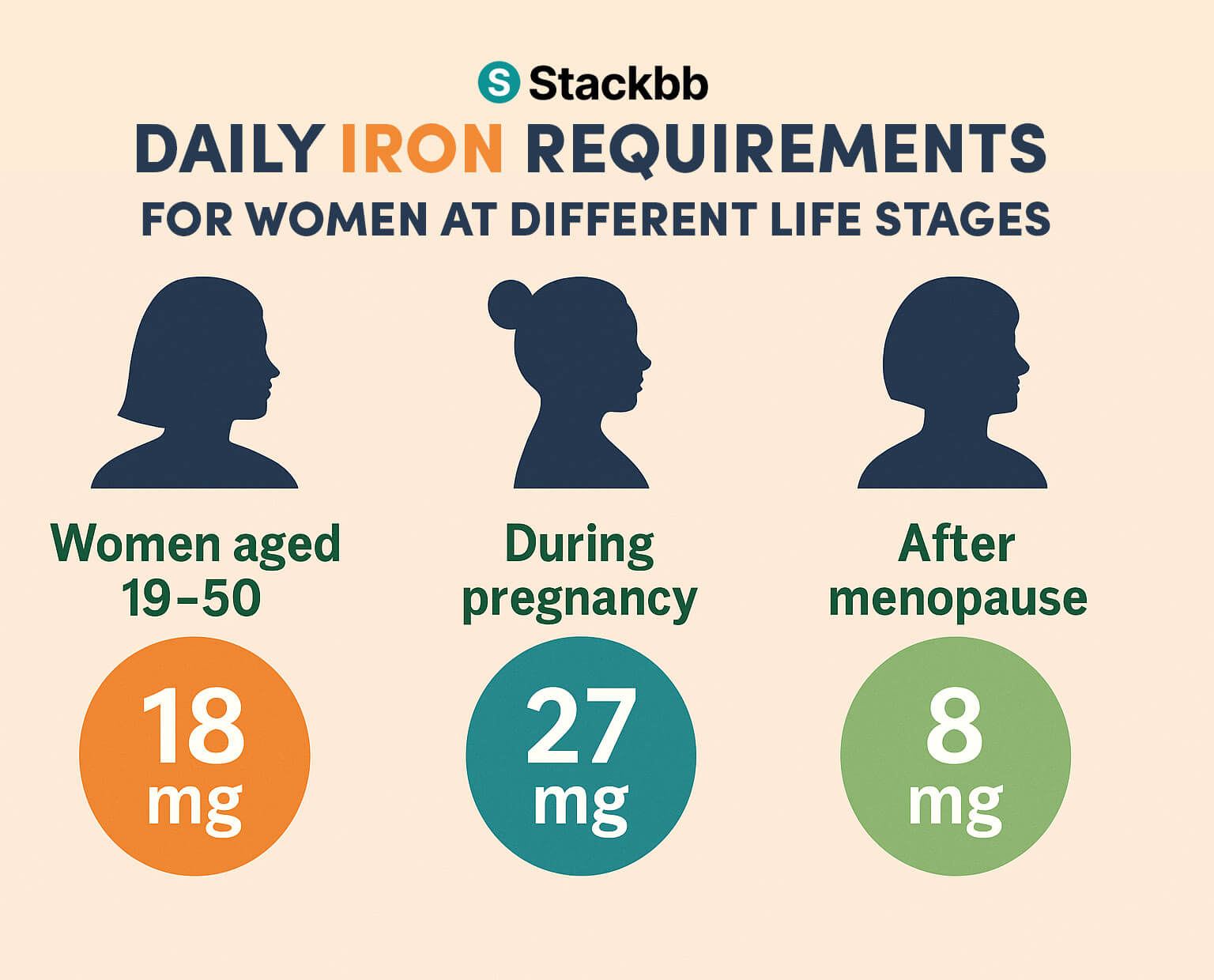
Iron Deficiency in Women: Why It’s So Common and How Supplements Can Help

Fatigue that doesn’t go away, pale skin, shortness of breath: these can all be signs of iron deficiency, a condition that affects women more often than men. Iron is essential for carrying oxygen in the blood, yet many women don’t get enough. Let’s look at why this happens so frequently, and how the right supplements can make a difference.
Why Iron Deficiency Affects Women More Often
Iron deficiency is the most common nutritional deficiency worldwide, and women are especially at risk. The main reasons include:
- Monthly blood loss during menstruation
- Increased needs during pregnancy and breastfeeding
- Lower dietary intake compared to men, especially in plant-based diets
Understanding these factors helps explain why so many women struggle with low iron levels at some point in their lives.
Signs and Symptoms You Shouldn’t Ignore
- Persistent fatigue or weakness
- Pale skin or brittle nails
- Shortness of breath, rapid heartbeat
- Headaches, dizziness, or brain fog
- Cold hands and feet
These symptoms can creep up gradually, making it important to recognize them early.
How Much Iron Do Women Really Need?

Daily requirements
Women aged 19–50 need about 18 mg of iron daily (while men need only about 8 mg).
During pregnancy, needs rise to around 27 mg.
After menopause, requirements drop back to 8 mg daily.
Dietary sources of iron
Heme iron (from meat, poultry, fish) is more easily absorbed than non-heme iron (from beans, lentils, spinach). Pairing non-heme iron with vitamin C (like citrus fruits) helps boost absorption.
When Food Isn’t Enough: The Role of Supplements
For many women, diet alone doesn’t fully meet iron needs, especially during menstruation or pregnancy. This is where supplements come in:
- Iron tablets or capsules: Commonly prescribed for deficiency, available in different forms (ferrous sulfate, gluconate, fumarate).
- Liquid iron: Easier on digestion and often chosen by those with sensitive stomachs.
- Multivitamins with iron: Useful for women who want broad coverage, though usually contain lower amounts.
Supplements can be very effective, but the type and dose matter.
Possible Side Effects and How to Minimize Them
Some women experience constipation, nausea, or stomach upset from iron supplements. To reduce side effects:
- Start with a lower dose and increase gradually
- Take iron with food (but avoid tea, coffee, or dairy at the same time)
- Try slow-release or liquid forms if tablets are harsh
Who Should Get Their Iron Levels Tested?
It’s worth asking for a blood test if you:
- Have heavy or irregular periods
- Are pregnant or planning pregnancy
- Follow a vegetarian or vegan diet
- Experience chronic fatigue or unexplained weakness
A simple ferritin test can reveal whether iron stores are low.
Conclusion: Taking Charge of Your Iron Levels
Iron deficiency is common in women, but it’s not something you have to live with. By recognizing the signs, eating iron-rich foods, and supplementing when necessary, you can restore energy and protect your long-term health. If you suspect low iron, a quick test and the right supplement could make all the difference.
FAQs
Why is iron deficiency more common in women?
Women are more likely to experience iron deficiency due to monthly blood loss during menstruation, increased needs during pregnancy and breastfeeding, and lower average dietary intake compared to men.
What are the early signs of low iron in women?
Early symptoms can include fatigue, pale skin, brittle nails, headaches, dizziness, or shortness of breath. Because they develop gradually, they are often overlooked.
How much iron do women need each day?
Women aged 19–50 generally need about 18 mg per day, while pregnant women need around 27 mg. After menopause, needs drop to about 8 mg daily, similar to men.
What is the best way to get enough iron?
Good food sources include red meat, poultry, and fish (heme iron, easily absorbed), as well as beans, lentils, and leafy greens (non-heme iron, best absorbed with vitamin C). Supplements can help if diet alone is not sufficient.
Are iron supplements safe?
Iron supplements are safe when taken at the correct dose. Some women experience mild side effects such as constipation or stomach upset, which can be reduced by starting with a lower dose or choosing a gentler form like liquid iron.
When should women get their iron levels tested?
Testing is recommended for women with heavy periods, during pregnancy, if following a vegetarian or vegan diet, or if experiencing chronic fatigue. A ferritin test can quickly show if iron stores are low.
This article was originally published on Stackbb, your trusted source for science-based supplement guides.






